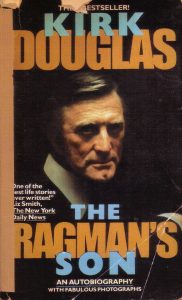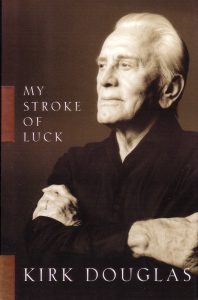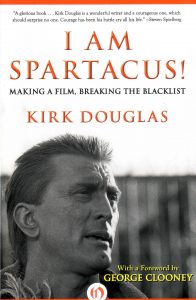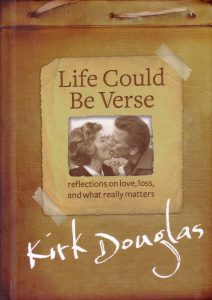by Sachi Sri Kantha, March 4, 2020
Kirk Douglas, aka Issur Danielovitch (birth name), one of the last heroes of Hollywood’s studio era, bid goodbye to his fans on February 5th, after living for a century and three years. Though his oeuvre as a cine actor extends to nearly 90 movies (including his classics, Lust for Life, Gunfight at O K Corral, and Spartacus), he became a hero to me, because I came to like him as one of the good chroniclers of own life.
 Twelve years ago, when Charlton Heston died, I contributed my thoughts on him, under the caption ‘Ten Canons from Charlton Heston – the Movie Moses’ [https://www.sangam.org/2008/05/Heston.php?uid=2920]. What I wrote then, applies to the three Kirk Douglas movies I had mentioned.
Twelve years ago, when Charlton Heston died, I contributed my thoughts on him, under the caption ‘Ten Canons from Charlton Heston – the Movie Moses’ [https://www.sangam.org/2008/05/Heston.php?uid=2920]. What I wrote then, applies to the three Kirk Douglas movies I had mentioned.
Here are those lines:
“As a teenager from a conservative household, one had to negotiate the terms with parents to get permission for a visit to a movie theater. Even when my father was somewhat lenient relating to my movie madness, my mother held the ultimate veto. In those days, my mother was a conservative type, and she was strict on quite a few things relating to movies. In her book of Commandments, (1) movies, with their voluptuous beauties, can corrupt young minds, that need to be focused on studies. (2) Hollywood movies flaunt sex, kissing and exhibitionism; thus, you better stick to Tamil movies. (3) The permissible limit is (at most!) one movie per month.”
So, I was able to watch the three classics of Kirk Douglas in big screen, only after I arrived in USA, between 1981 and 1985. More than his movies, I was strongly influenced by the four books Kirk wrote as autobiographical memoirs.
The Ragman’s Son (1988) – at the age of 71.
My Stroke of Luck (2002) – at the age of 86.
I am Spartacus – Making a Film, Breaking the Blacklist (2012) – at the age of 96.
Life Could be Verse – Reflections on Love, Loss and What Really Matters (2014) – at the age of 98.
 These were of educational value to me to understand the anthropology of American society, such as prevailing discrimination against Jews in the first half of the 20th century and paranoia on Russian Red scare. I also appreciated the grit of Kirk Douglas, in standing up to his conviction, in breaking the notorious black list of Hollywood paranoia and discrimination against gifted writers like Dalton Trumbo.
These were of educational value to me to understand the anthropology of American society, such as prevailing discrimination against Jews in the first half of the 20th century and paranoia on Russian Red scare. I also appreciated the grit of Kirk Douglas, in standing up to his conviction, in breaking the notorious black list of Hollywood paranoia and discrimination against gifted writers like Dalton Trumbo.
Many of the autobiographies (with some notable exceptions) of movie stars, politicians and sportsmen are ghost written. But, the books written by Kirk were indeed written by him. To preserve one’s senses and memories and to write books, while one is nearing a century of life in this world, is a dream of mine. Will I be able to achieve it? I liked the puns in two of his above mentioned book titles – ‘My Stroke of Luck’, and ‘Life Could be Verse’. Now at 66, I wonder even if I manage to live up to 71, whether I can live up to 86, when Kirk wrote his book, ‘My Stroke of Luck’. Kirk suffered his major stroke in 1996, when he was 80! And he was a heavy smoker for ten years. He had written, “Once I did learn to smoke, I couldn’t stop. I escalated to two packs a day very quickly, and stayed that way for about ten years.” But I was never a smoker, and I had already suffered a minor stroke when I was 55. Therefore, his ‘My Stroke of Luck’ has a special place in my bookshelf. It is a slim book of 196 pages with 22 short chapters, and no index.
In the penultimate paragraph Kirk had written, “I started writing this book to try and help people understand a stroke, and find a way to deal with it and function in life. I wanted to construct an Operator’s Manual that would be a guide for recovering from a stroke.” In his Operator’s Manual, Kirk lists six items.
Item 1: “When things go bad, always remember it could be worse.”
Item 2: “Never, never give up. Keep working on your speech and on your life.”
Item 3: “Never lose your sense of humor. Laugh at yourself, laugh with others.”
Item 4: “Stem depression by thinking of, reaching out to, and helping others. Strive to be a Little Hero.”
Item 5: “Do unto others as you would have them do unto you.”
Item 6: “Pray. Not for God to cure you, but to help you help yourself.”
Then, Kirk ended his book with three simple sentences. “We all have a handicap – big or small. But we must overcome our hardships to become better people. We must try, we must try.”
These observations of Kirk, are nothing profound. But, it comes from the mind of a guy who struggled to achieve access and lived for 103 years; His iconic creativity as a movie actor and producer is a dream for thousands of actors who had followed his path. Still, he was felt unsatisfied with his success. He wrote, “All my life, I had wanted to be a star on the American stage. I hadn’t succeeded; I felt like a failure.”
Kirk’s autobiography, ‘The Ragman’s Son’ (1988), I read first in 1989 captured my heart. 43 crispy chapters, of life of a poor Jewish boy of illiterate Russian immigrants, who reached the pinnacle of Hollywood by sheer diligence, filled with warts. He wrote,
“I was born in abject poverty. My parents came here from Russia, illiterate immigrants. I had nowhere to go but up.”
First, that title, and Kirk’s humility in identifying himself as a son of an illiterate rag picker, impressed me a lot. Secondly, it was the first book I read in English where four letter words (shit, fuck, SOB) were cavalierly spilled in many pages, when Kirk (1) described his sexual conquests as an outsider to the racist American society, (2) showed his irritation with his senior peers and contemporaries, and (3) projected his frustration to unexpected setbacks.
 Thirdly, I came to like him, because he described himself as a ‘loner’. This pinched my nerves; I also consider myself as a loner. What Kirk had written, “I never had many friends. I was always alone, somehow always outside the circle, and yet desperately wanting so much to be a part of it. I never allowed anyone to get too close to the soft, vulnerable core of me that was Issur.” appealed to me as well. ‘Appu’ (the pet name I was called by my parents) was my equivalent of Kirk’s Issur.
Thirdly, I came to like him, because he described himself as a ‘loner’. This pinched my nerves; I also consider myself as a loner. What Kirk had written, “I never had many friends. I was always alone, somehow always outside the circle, and yet desperately wanting so much to be a part of it. I never allowed anyone to get too close to the soft, vulnerable core of me that was Issur.” appealed to me as well. ‘Appu’ (the pet name I was called by my parents) was my equivalent of Kirk’s Issur.
Fourthly, I liked Kirk’s honest descriptions of rejections he faced at every stage of his life, at the university, at the New York stage, and at the Hollywood when he was a rookie in 1940s. On rejections, Kirk had written, “The pathetic side of our profession; the rejections. They are so shattering, so devastating. The hurt of it never leaves you. The pain is always there….Rejection is just something that you endure. It doesn’t leave even if you become a star. Then you get rejected on a different level. There’s a part that you want to do, and some other star gets it. The definition of an actor – someone who loves rejection.”
Rejection is NOT endemic to actors only. Even in my profession as a scientist-teacher, rejection is part and parcel of our life. We get rejected when we submit our research findings to journals. We get rejected when we apply for research grants. We get rejected when we apply for ‘ideal’ positions at the universities and research institutes. We get rejected in awards and prizes, to which we have been nominated. After reading his ‘The Ragman’s Son’ book, I realized in 1990, Kirk was lucky in one sense. His parents emigrated from Russia. And they were white skinned. Even when his father struggled as a rag picker, Kirk as an Amsterdam (New York) born white youth had ample opportunities and doors opened when compared to his native born Black and Hispanic youth in 1930s and 1940s.
 Kirk legally changed his name from Izzur Danielovitch to Kirk Douglas to advance his career. He had written, “When I left Amsterdam to go to college, I left Issur behind and Izzy took over. (Little did I know that Issur was with me all the time.) Now Izzy, who had done so much and won so many honors at St. Lawrence University, was killed in the Tamarack Playhouse, and Kirk Douglas took over.” This was around 1940. I realized while I was living in USA in 1980s that having a non-Christian Hindu name (like that of Sachithanantham Sri Kantha) became the first elimination step, when I applied for jobs, even though I had satisfactory requirements to be called for an interview. Few of my acquaintances who had Christian names (say for example, Daniel, Hoole, Hoover) could scrape through the first bar. Later when I moved to Japan in 1990s, I still encounter this name discrimination for the positions I had applied. Unlike Kirk, I was too proud of the name given by my parents and had continued to live this name despite all the demerits it had heaped for my career.
Kirk legally changed his name from Izzur Danielovitch to Kirk Douglas to advance his career. He had written, “When I left Amsterdam to go to college, I left Issur behind and Izzy took over. (Little did I know that Issur was with me all the time.) Now Izzy, who had done so much and won so many honors at St. Lawrence University, was killed in the Tamarack Playhouse, and Kirk Douglas took over.” This was around 1940. I realized while I was living in USA in 1980s that having a non-Christian Hindu name (like that of Sachithanantham Sri Kantha) became the first elimination step, when I applied for jobs, even though I had satisfactory requirements to be called for an interview. Few of my acquaintances who had Christian names (say for example, Daniel, Hoole, Hoover) could scrape through the first bar. Later when I moved to Japan in 1990s, I still encounter this name discrimination for the positions I had applied. Unlike Kirk, I was too proud of the name given by my parents and had continued to live this name despite all the demerits it had heaped for my career.
Nevertheless, I still gain encouragement from the six items of his Operators Manual. I had learnt in life that quite many ‘missed opportunities’ turned out to be blessing in disguise for my later success. I provide a list a few of Kirk’s bons mots (which I liked), from his autobiography.
“You can be a shit and be talented and conversely, you can be the nicest guy in the world and not have any talent.”
“A film is a collaborative effort. It is rare that a movie is ever one person’s film. Perhaps people like Charlie Chaplin, Orson Welles, Woody Allen, Barbra Streisand, who write, direct, and star in their pictures, are entitled to that billing. Yet even they need help – producers, casting directors, editors, technicians, location managers, other actors.”
“Why is it that often the people you do the most for resent you the most? Maybe you remind them of their weaknesses. The hell with them.”
“I have never been a big gambler. I gamble with my own money – buy a book, develop the property, pay the writer, and take my chances.”
“Beware of women – sometimes they seem weak, but they’re really strong.”
“Kinderstube, a German word that means ‘child upbringing’, and is usually related to adults. Either they have good manners as a result of Kinderstube, or bad manners because of the lack of it.”
“For some people, killing is an aphrodisiac. The white hunters told me stories of rich women who wanted to have sex with them on top of animals that were dead or dying. The women loved it; it was a turn-on for them.”
“I’m always surprised when people in high positions don’t realize how they reveal themselves. Maybe because I’m an actor, I’m used to observing people, picking up clues.”
“One of my favorite quotations used to be, ‘How dull it is to pause, to make an end/ To rust unburnished, not to shine in use.’ I lived by it. But now I know, we must take a pause. Take inventory. Make an evaluation.”
Here is one verse of Kirk Douglas – on Luck.
“They call it ‘luck’
It can’t be taught.
It can’t be borrowed,
Can’t be bought.
It’s more like destiny – or fate,
It may not find you, so
Do not wait.
Seize every moment.
Don’t be deterred.
We make our own luck.
It’s just a word.”
Finally, words of Kirk Douglas on religion, deserves our attention too. In the epilogue to his book, ‘Spartacus’, Kirk had written, “I believe much of the divisiveness in the world has been caused by religion, even in the time of Spartacus when they worshipped many gods. What is the purpose of religion? After ninety five years on this planet, I have come to the conclusion that religion should be based only on one thing: helping your fellow man. If everybody followed that religion – helping his fellow man – armies would vanish overnight. Injustice, intolerance, and inhumanity would disappear. And blacklists would never be written. What a wonderful world that would be.”
Thinking about ‘blacklists’, as a Sri Lankan-born Tamil, I also faced an experience as a victim of a U.S. State Department’s blacklist in 2004 – I mean, the notorious ‘No Fly List’. I wonder why there aren’t any celebrity Americans in the mold and conviction of Kirk Douglas, to raise their opposition against this 21st century blacklist?
*****